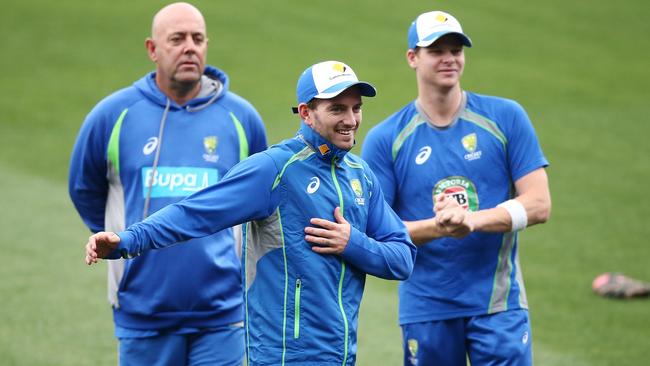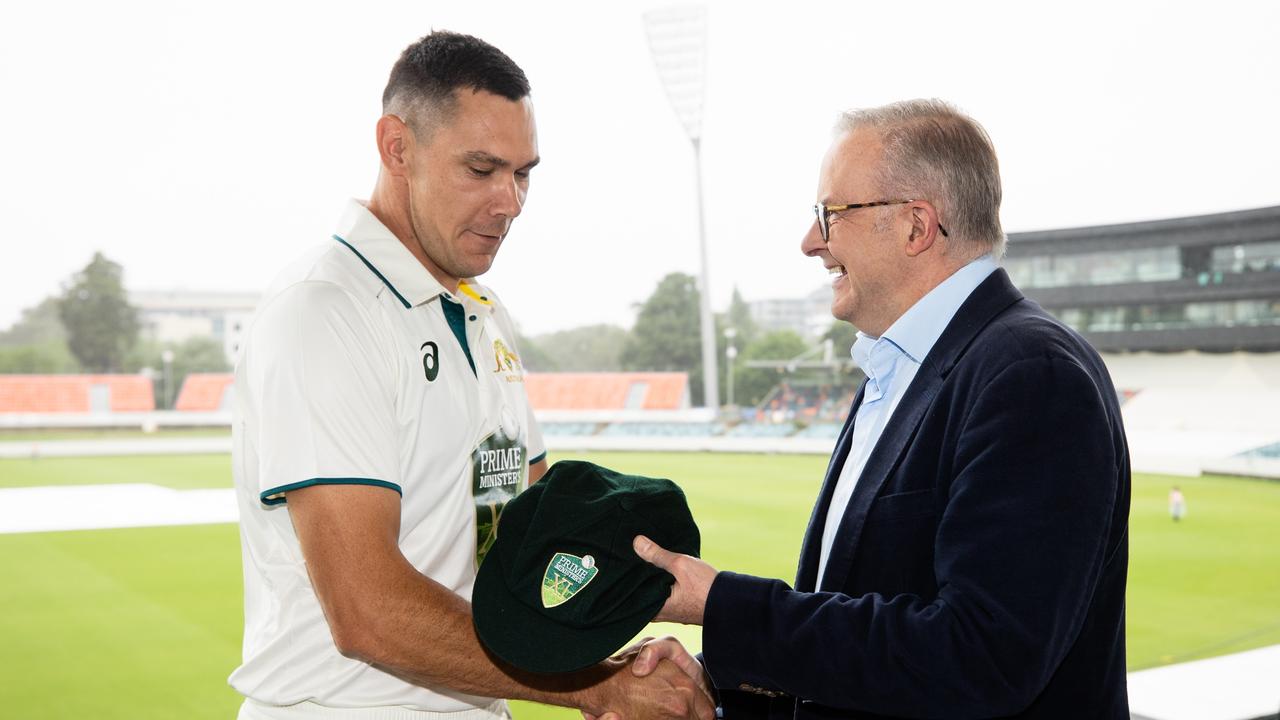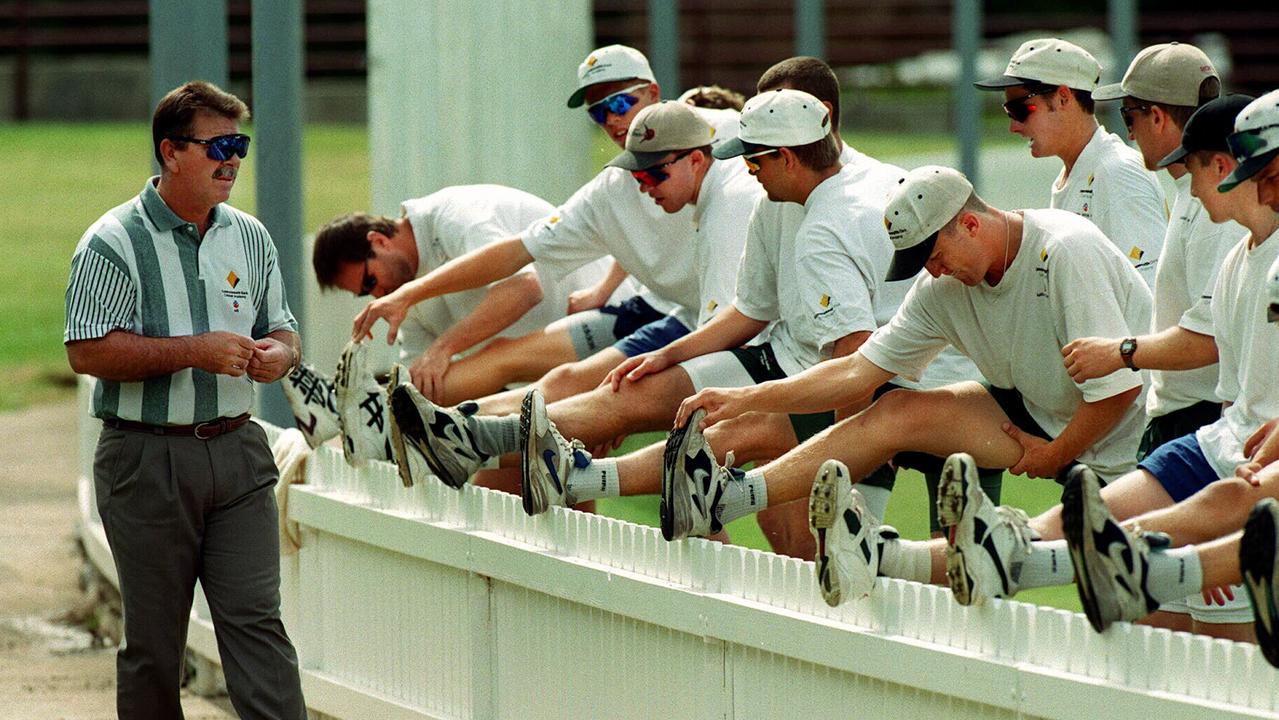Australian cricket’s youth experiment should extend to the coach, says Catherine McGregor
THE winds of change are blowing through Australian cricket and a new coach could extract the best results from this new unit, says Catherine McGregor.

Opinion
Don't miss out on the headlines from Opinion. Followed categories will be added to My News.
CRICKET matters to Australians. We hate losing.
When it becomes a habit, the public and press pile on and demand the restoration of national honour.
Most of us get more upset at the failure of our cricket team than falls in the share market.
GET INVOLVED: 10 COMMANDMENTS OF SUPERCOACH BBL
FORMER COACH: ARTHUR AT PEACE WITH AUSSIE AXING
NEW ERA: THE MEETING THAT CHANGED AUSTRALIAN CRICKET
We are more likely to demand a coach or captain be sacked than a mug who has blown our life savings in a dodgy investment scheme.
That’s why we breathed a collective sigh of relief after a win over South Africa in Adelaide this week.
Staring down the barrel of a sixth consecutive loss, Steve Smith’s tyros rose to the occasion.
I have had plenty to say about the coaching, selection and preparation of the team, and still think that we need a new coach.
Darren Lehmann stepped into an awful situation after the turmoil of ‘Homework Gate’ with Australia floundering in England.
He soon rebuilt pride and morale, recovered the Ashes and steered Australia to a World Cup.
However, the winds of change are now blowing through Australian cricket and a new coach could extract the best results from this new unit that Steve Smith is now assertively claiming as his very own team.
CRASH CRADDOCK: THE MAN WHO MAKES WAY FOR MARSH
GLOVE BATTLE: AUSTRALIA’S OTHER TEST KEEPING OPTION
Lehmann has been a great servant of the game but I would love to see Ricky Ponting at the helm of this emerging group of players.
To many of this group, he was a childhood hero.
Yet he has played recently enough to understand the pressures that they face from relentless media and playing schedules across multiple formats.
He has shared a dressing room with Smith and would be a terrific mentor to the young skipper as he moulds a new team and embarks on what may be remembered as the ‘Smith era’.
One win is not enough to even term it ‘rebuilding’, let alone a revival. But let’s give credit where it is due.
The selectors made radical changes and unabashedly injected new blood into the ailing body of Australian cricket. For that they were ridiculed in many quarters.
Even after the win some critics remained dismissive. ‘Dead Rubber’ they proclaimed.
Make no mistake South Africa wanted to crush Australia and claim a series whitewash especially after the furore over the ball tampering incident involving their captain Faf du Plessis.
They desperately wanted to win, but were simply outplayed.
So the experiment with youth paid off.
In particular, Matt Renshaw and Peter Handscomb looked at home at the top level. Renshaw is an old school opener, who knows where his off stump is.
Surviving until stumps on the first evening after an audacious declaration by du Plessis revealed both maturity and character.
Handscomb notched a very good half-century on debut, held a vital catch in the gully to dispatch the South Africa captain, and hit the winning runs.
There’s a future Australia captain in this bloke.
Renshaw puts a price on his wicket. He has some technical flaws and the selectors expect that he may get a holiday if the bowlers work him out. But they believe he has a long-term future. Likewise, they have much hope invested in another new kid, Hilton Cartwright, who is a product of the high performance system of which I have been critical.
He is another old head on young shoulders, who hits the ball very hard and provides a decent bowling option. He will debut in the one-day series against New Zealand and the selectors expect it to mark the start of an impressive career.
Both the high performance manager and selectors are now placing much more emphasis on youth, not just for its own sake but because they felt Australia’s fielding had lost its edge.
On balance a 21-year-old will be preferred to a 35-year-old from now on.
It can be said with certainty that Callum Ferguson’s name has been deleted permanently, though there is still a belief that Mitchell Marsh can fight his way back in to Test cricket.
There is still a question mark over Matthew Wade’s glove work. He needs to score more heavily than he did in Adelaide to offset his keeping.
But at this stage, barring injury, I expect that the panel will try to give this team a chance to perform against Pakistan before making any more changes.
How good is Pakistan?
Well, just as I thought history pointed to a South African hat-trick in the series just completed, Pakistan has a very poor record on the road, especially in Australia, where they have not won a Test match this century.
The results will depend very much whether Pakistan show up.
Having watched their fightback to draw a series in England 2-2, I was convinced that they would trouble Australia.
Unlike the mercurial, talented Pakistan teams of the past, this team is built more on resilience and work ethic than unpredictable talent.
Their bowling is strong with two left arm quicks — Mohammed Amir and Wahab Riaz — who can swing the ball both ways very late.
Amir is also genuinely quick and has more than a touch of Wasim Akram about him. He has been badly let down by his teammates since his comeback from a ban for match fixing.
They have dropped 12 catches off his bowling.
But he is a danger man.
In Yasir Shah they have a high quality leg spinner who should get help from our bouncy pitches.
But their pitiful showing in New Zealand is making me revise my opinion of them.
They lost 2-0 against the Kiwis, who are a decent team and tough to beat at home.
But Pakistan lost its last nine wickets in the final session of the second Test to lose by 138 runs. Their batting was considered fragile before the tour of England but defied those low expectations.
I suspect they will not give their bowlers enough runs to play with.
Originally published as Australian cricket’s youth experiment should extend to the coach, says Catherine McGregor


